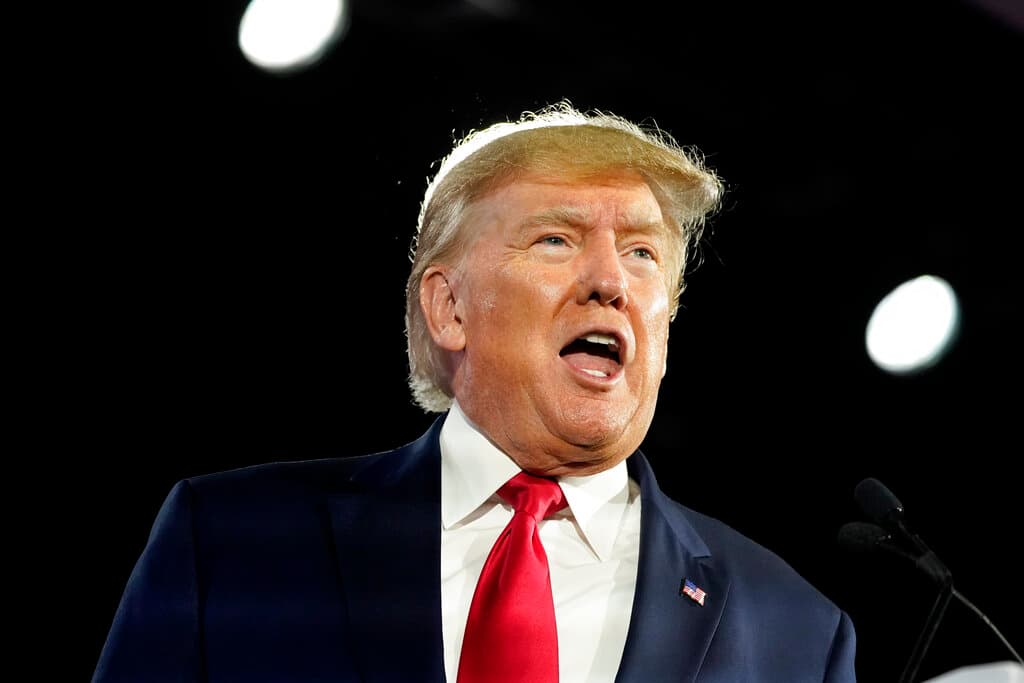Can National Review Survive the Trump Phenomenon?
Not, says one of its ex-columnists, by using the former president’s denunciations of the magazine to raise money for its continued publication.

It is disagreeable to me to have to take issue publicly with my friend Rich Lowry, editor of the National Review. He graciously invited me to become a columnist for the National Review after I had been convicted of crimes (that it is now generally accepted I did not commit), and was awaiting the date when I had been instructed to self-surrender to the prison where I had been assigned.
Rich loyally stuck with me as I sent in my columns from captivity and welcomed me pleasantly back to New York after the Supreme Court vacated my convictions. He is a courteous man and often an elegant writer, and I bear him nothing but goodwill. It was, though, increasingly difficult for me to be happy at the National Review, because of what I considered its own incoherent and at times discreditable response to the Trump phenomenon.
That Rich and his colleagues had difficulty maintaining a positive attitude to Mr. Trump because of the disparity between their agreement with most of his policies and the revulsion they felt for a number of his personality traits and practices is understandable. Even though the former president is an old friend who was also supportive to me in my time of difficulty, I have wrestled at times with the same problems. So have millions of others.
While the National Review’s ambivalence about Donald Trump is partly understandable, it is implausible and unseemly for Rich Lowry to solicit financial support for the National Review because President Trump denounced it, albeit, as Rich wrote, fairly mildly by Mr. Trump’s standards. He said the NR “was run by lightweights who serve no purpose and whose publication deserves to die.”
I don’t agree with that, but given the National Review’s frequently gratuitously hostile and sometimes apparently malicious reflections on the former president, it is fair comment, and an absurd basis for a request for ex gratia generosity from the readers. Rich Lowry was carried away by his importunity to describe the National Review as “a fearless voice speaking the truth,” which has been “principled, prudent, and correct” in its ”unadorned truth-telling… In fair weather and foul.”
This is, to say the least, a bowdlerized version of the facts. No one can be blamed for a self-serving formulation of a request for financial support. The National Review’s stance on the Trump phenomenon, though, has been substantially dishonest and tactically maladroit.
Many commentators, including some distinguished writers who have departed the National Review in the Trump era, have managed with ethical consistency to argue that the former president’s effectiveness at essentially eliminating unemployment, oil imports, illegal immigration, self-punitive national abasement before the Obama green terror, and his success in lowering taxes, advancing Middle East peace, restraining North Korea and Iran, rebuilding national defense, and reducing NATO Allied freeloading vastly transcends his stylistic shortcomings, irritating though those often have been.
The National Review has allowed the peer pressure and vile snobbery of the complacent and narrow-minded commentariat to push it into an inelegant straddle: occasionally professing agreement with the ex-president but constantly pandering to the affectations of the relatively literate ranks among Trump-haters.
In the ultimate litmus tests of contemporary American conservatism, the National Review was effectively incapable of recommending a vote for Mr. Trump over Hillary Clinton or over Joe Biden, and is tainted in what it now regularly (and rightly) excoriates as one of the most incompetent administrations since before the Civil War.
Rich Lowry claimed as he passed his cyber-begging bowl this week that under his direction the National Review has been “happy to give Trump credit where it’s due.” Its almost unwavering failure to do that is one of the reasons why I contemplated for many months retiring from it, before I did so.
I remained out of loyalty to the memory of Bill Buckley and to Rich and the former publisher, Jack Fowler, until I was informed that a completely inoffensive piece I had submitted commenting on the incomparably greater tensions with the domestic Islamic community in France than with that in the United States, was rejected by a junior editorial person with inappropriate curtness and pomposity.
I assumed it was designed by higher-ups to secure my retirement because of my rather more sympathetic stance to Mr. Trump than the National Review’s and sent in my resignation by return of email with best wishes to Rich and his team. There was not even an acknowledgment, after 13 years of cordial association.
The only discussion I had with Rich in those years over anything I wrote for him was about a piece I submitted which was mildly critical of Rupert Murdoch’s handling of one issue, and Rich explained that he could not publish anything critical of Mr. Murdoch because Mr. Murdoch ran Rich’s column in the New York Post, and was a supporter of the NR. I have known Mr. Murdoch for 40 years, generally quite cordially, and have great respect for him; Rich raised a legitimate point, but he should remember the truism about living in a glass house.
In Monday’s anti-Trump fundraising request, Rich rejected Mr. Trump’s suggestion that the National Review was compromised by the nature of its financial support. He referred to the broad base of the magazine’s contributors and subscribers. I believe Donald Trump was referring to some of the advertisers, such as Google, and in all of the circumstances, Rich’s protestations of rugged financial independence and disinterested impartial integrity are not believable.
The unfortunate fact is that the National Review completely bungled the challenge of maintaining its own standards and its policy integrity through the Trump years, while making it clear that it considered the many crudenesses of Mr. Trump and his administration as being of greater national importance than the deliverance he gave America and the world from the sleaze and cynicism of a Clinton renascence, and the salvation Mr. Trump offered from the present pale of horror Bidenization has wrought on America, in which the National Review now unctuously ignores its complicity.
Because I disagree with Donald Trump’s low opinion of Rich Lowry and his colleagues and with his verdict on the magazine’s merits and right to life, I restate my good wishes to Rich and the NR but if they don’t raise their game, their endless carpet-bombing of their email lists for financial support will not avert the fate Donald Trump wishes for them.

